Sales qualification streamlines the process of turning potential buyers into serious prospects.
When done well, sales qualification reduces the time required to determine if you’re talking to the right person. Are they interested in what you’re offering? Is there a specific business challenge your product could help them overcome?
Free Download: 101 Sales Qualification Questions [Access Now]
I’ve had my fair share of practice — and I’ve learned that great sales qualification is more than worth the effort. Ready to get started? I’ve got you covered with our ultimate guide to finding and keeping qualified sales leads.
Table of Contents
- What is Sales Qualification?
- Why is Sales Qualification Important?
- Sales Qualification Stages
- The Lead Qualification Process
- What is a Qualified Prospect?
- Levels of Prospect Qualification
- When and Why to Disqualify Prospects
- How to Qualify a Lead with Lead Qualification Frameworks
- Sales Qualifying: Good Signs and Red Flags
What is Sales Qualification?
Sales qualification is the process of determining whether a lead or prospect is a good fit for your product or service. This assessment takes place during sales calls and is important when determining which customers may stick around long-term.
Without sales qualification, you’d probably talk to hundreds of leads a day — only to wind up with just one or two closed deals to show for your effort.
Sales qualification is essential for working smarter, not harder. But why is it so crucial? Let’s take a look.
.png)
Free Guide: 101 Sales Qualification Questions
101 Questions to Ask Contacts When Qualifying, Closing, Negotiating, and Upselling.
- Budget Questions
- Business Impact Questions
- Competitor Questions
- And More!
Download Free
All fields are required.
.png)
Why is Sales Qualification Important?
Sales qualification significantly improves close ratios. Otherwise, you risk pursuing leads who aren’t a good fit. They may have incompatible budgetary constraints or organizational challenges.
B2B buying groups spend 27% of their time conducting independent online research. With buyers doing so much self-education, effective sales qualification becomes even more critical to engage prospects at the right time with the right information.
There are a ton more reasons sales qualification is important. You can:
- Prioritize qualified prospects
- Deliver personalized selling experiences (our research even shows 75% of marketers believe personalized experiences drive sales and repeat business.)
- Maximize revenue impact
- Tailor processes for different verticals
I once tried to sell my content strategy service to a lead I hadn’t qualified. The partnership was a poor fit, and we had to cancel the agreement prematurely.
What does the sales qualification process look like as a whole? Let’s walk through that below.
Sales Qualification Stages
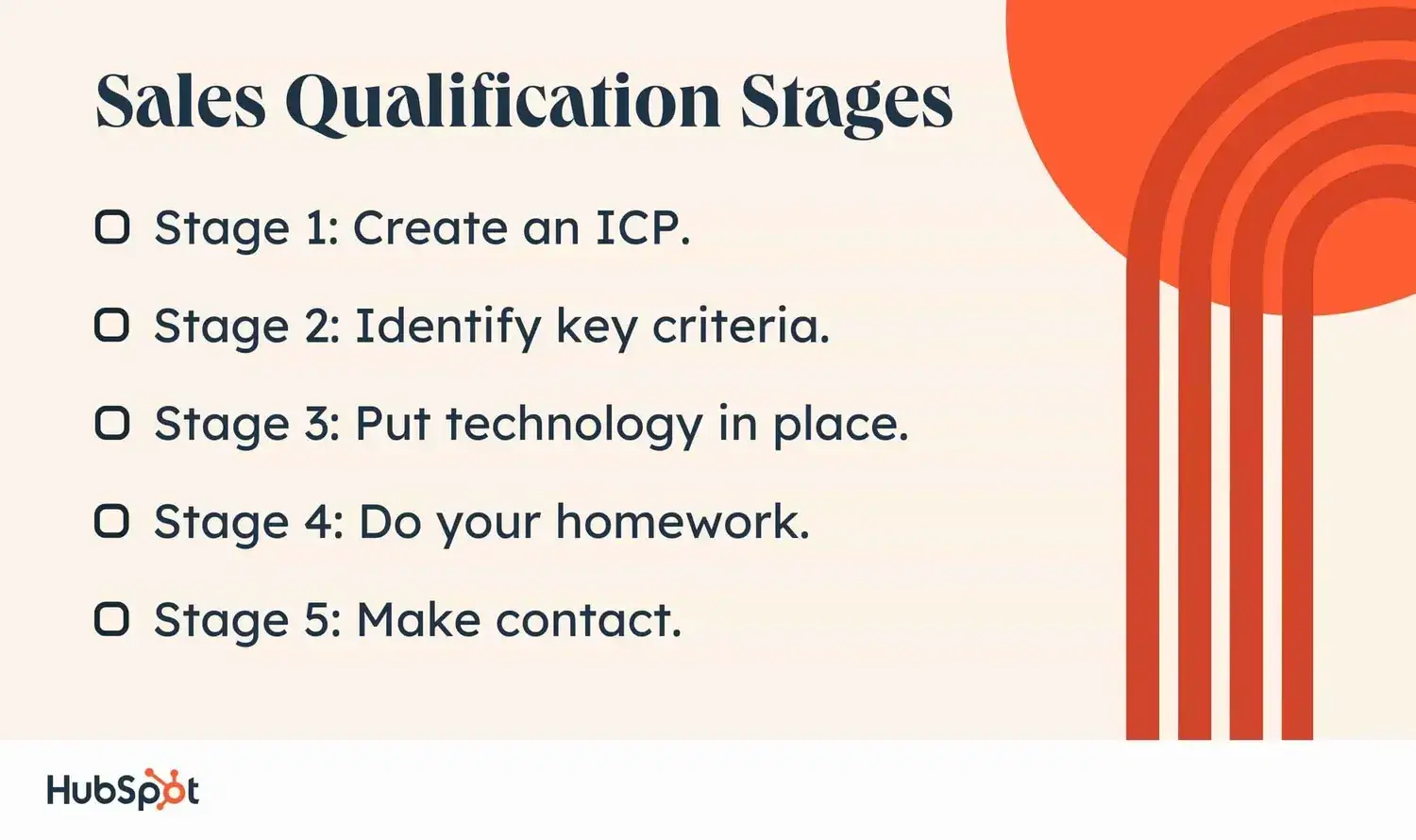
Stage 1: Create an ICP.
The first stage of sales qualification is creating an ideal customer profile (ICP). You identify the type of customers best suited to your product or solution.
For example, since I offer content writing and strategy service to B2B SaaS companies, my ideal market might consist of brands with enough funding to spend on my services.
Within an ICP, it’s also worth developing buyer personas that describe specific individuals within target organizations. These individuals have the experience and authority to address business pain points and make purchasing decisions.
Creating an ICP is a collaborative process between sales, marketing, and product development teams. However, the end result streamlines sales qualification, making the exercise time well spent.
Stage 2: Identify key criteria.
Next, identify criteria for sales leads before they’re placed in the qualification pipe. This process helps eliminate leads who are less likely to convert from interest to investment.
Key qualification criteria:
- Business budget.
- Buying authority.
- Urgency to deploy a new solution.
- Fit with existing company frameworks.
For example, a prospect with urgency and authority but no budget isn't worth pursuing, despite their interest.
Pro tip: Create a checklist for these criteria you can distribute to salespeople to ensure all employees use the same method to evaluate sales potential.
Stage 3: Put technology in place.
The amount of sales, research, and prospect data required for successful sales qualification is substantial. Even experienced teams can get overwhelmed.
Deploy customer relationship management (CRM) solutions to capture and centralize data for sales and marketing teams. Your team can also track emerging trends in customer behavior to help create more effective sales strategies.
.png)
Free Guide: 101 Sales Qualification Questions
101 Questions to Ask Contacts When Qualifying, Closing, Negotiating, and Upselling.
- Budget Questions
- Business Impact Questions
- Competitor Questions
- And More!
Download Free
All fields are required.
.png)
Stage 4: Do your homework.
The more you know about your leads, the better.
The sales process is about creating relationships, and even the best product won't sell if your team fails to build reciprocal connections.
Research is crucial for building relationships. Before contacting leads, learn about their role, company, and any public insights they've shared.
It’s also a good idea to track down any relevant company information. This might take the form of a recent news article or a report posted on their corporate site. You can gain more context to the conversation.
Stage 5: Make contact.
Finally, reach out to set up a qualifying call.
With lead data in hand, connect via phone, email, or social media sites and set up a qualifying call. Use this call to understand the lead's decision-making process, pain points, budgets, and needs — not to make an immediate sale.
More importantly, you’re looking to kick-start a relationship. If you go all-in on sales tactics during the first call and this approach doesn’t work, you’ve burned a bridge.
The Lead Qualification Process
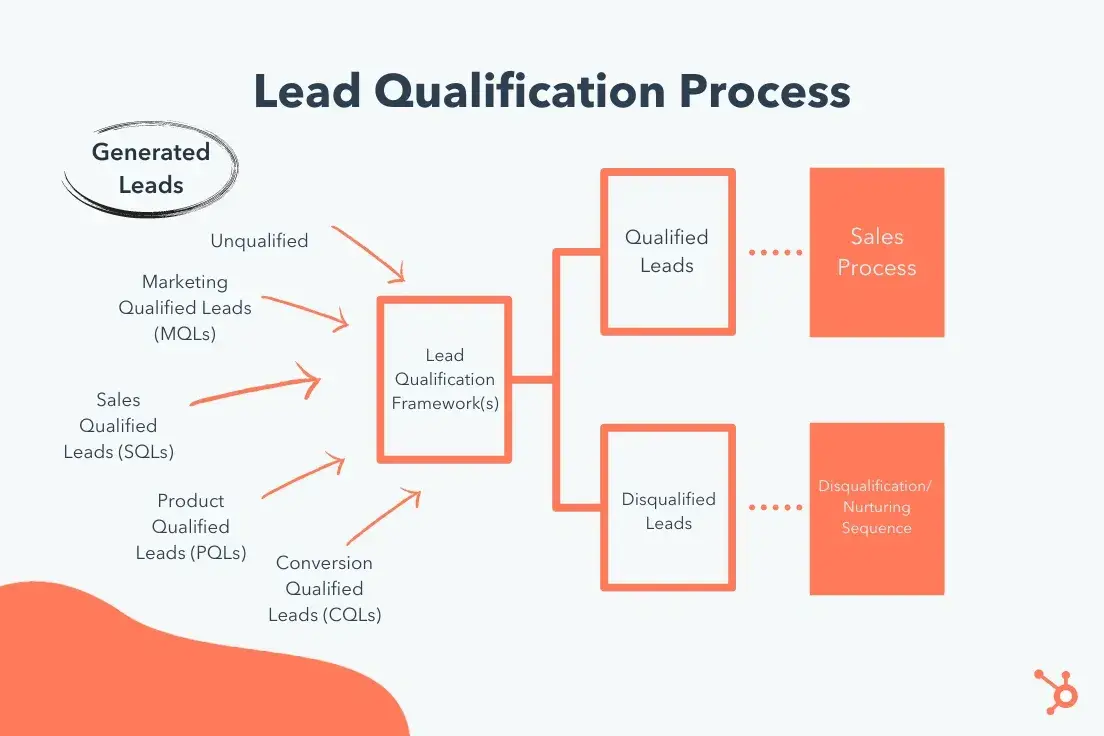
Step 1: Lead Generation
The lead qualification process begins with a pool of leads generated through various channels. These typically come from marketing efforts, sales activities, acquisition campaigns, and product teams. For smaller organizations, leads may primarily originate from website form submissions.
Step 2: Initial Lead Classification
As leads enter the system, they’re classified into different categories based on their current status and level of engagement:
- Unqualified leads haven’t been nurtured enough in the flywheel to be forwarded to a sales team.
- Marketing qualified leads (MQLs) are suitable for marketing communications.
- Sales qualified leads (SQLs) are ready to connect with a sales representative.
- Product qualified leads (PQLs) have shown strong interest through freemium subscriptions or free trials.
- Conversion qualified leads (CQLs) have taken a specific action on your website, such as submitting a form or using a click-to-call button.
[Video: How to Qualifying Your Leads | Ask These 4 Questions to Generate Quality Leads online marketing]
Step 3: Lead Qualification Framework Application
Once classified, leads are evaluated using a lead qualification framework. This involves asking a series of qualifying questions to see if they're a good fit for your product or service.
A qualifying question helps the salesperson determine their prospect's fit for one criterion. That might be need, budget, authority, sense of urgency, or another factor.
A good qualifying question is typically open-ended. Instead of close-ended questions, like “Is this a priority right now?” the better version would be "Where does this fall on your list of business priorities?" to not lead the prospect to an answer.
Here are some strong qualifying questions that I like:
- What business challenge can this product help you solve?
- What has prevented you from trying to solve the problem until now?
- What does your budget look like for this project?
- Are you using any solutions to solve this problem? If so, why are you switching?
- What is your principal priority in terms of solving this problem? Which functionality would be most important?
The framework helps sales teams focus their efforts on the most promising prospects.
Step 4: Lead Segmentation and Next Steps
Based on the qualification process, leads are segmented into two main groups.
- Qualified leads proceed to the next stage of the sales process, where they'll receive more personalized attention from the sales team.
- Disqualified leads are placed into a nurturing sequence. Here, they receive targeted content and communications aimed at warming them up to the product, with the goal of converting them into qualified leads over time.
Step 5: Refine Process
The lead screening process is not static. It requires ongoing evaluation and optimization. Continuously refine the lead screening process. Optimize questions, identify successful prospect traits, and adjust frameworks to improve sales efficiency and conversion rates.
Eddie Reynolds, host of the RevOps Corner podcast, dials down on how important it is to constantly iterate on your lead qualification process.
“You set that account score, and then you surface all these leads, and you hand them to salespeople, and then salespeople say, I call these leads, and these were worthless,” Reynolds says. “This isn‘t set, and forget it. You keep iterating until you get to the point that salespeople are saying, ‘Yeah, we’re calling these leads, and they‘re converting, and everybody’s happy.'"
.png)
Free Guide: 101 Sales Qualification Questions
101 Questions to Ask Contacts When Qualifying, Closing, Negotiating, and Upselling.
- Budget Questions
- Business Impact Questions
- Competitor Questions
- And More!
Download Free
All fields are required.
.png)
What is a Qualified Prospect?
A qualified prospect has passed the initial screening and is now ready to enter the sales pipeline.
You’ll typically do the bulk of your qualification during a discovery call, but it certainly isn’t where qualification starts or ends. At every step of the sales process, you’ll continuously evaluate prospects for more and more specific characteristics.
Attributes of a Qualified Prospect
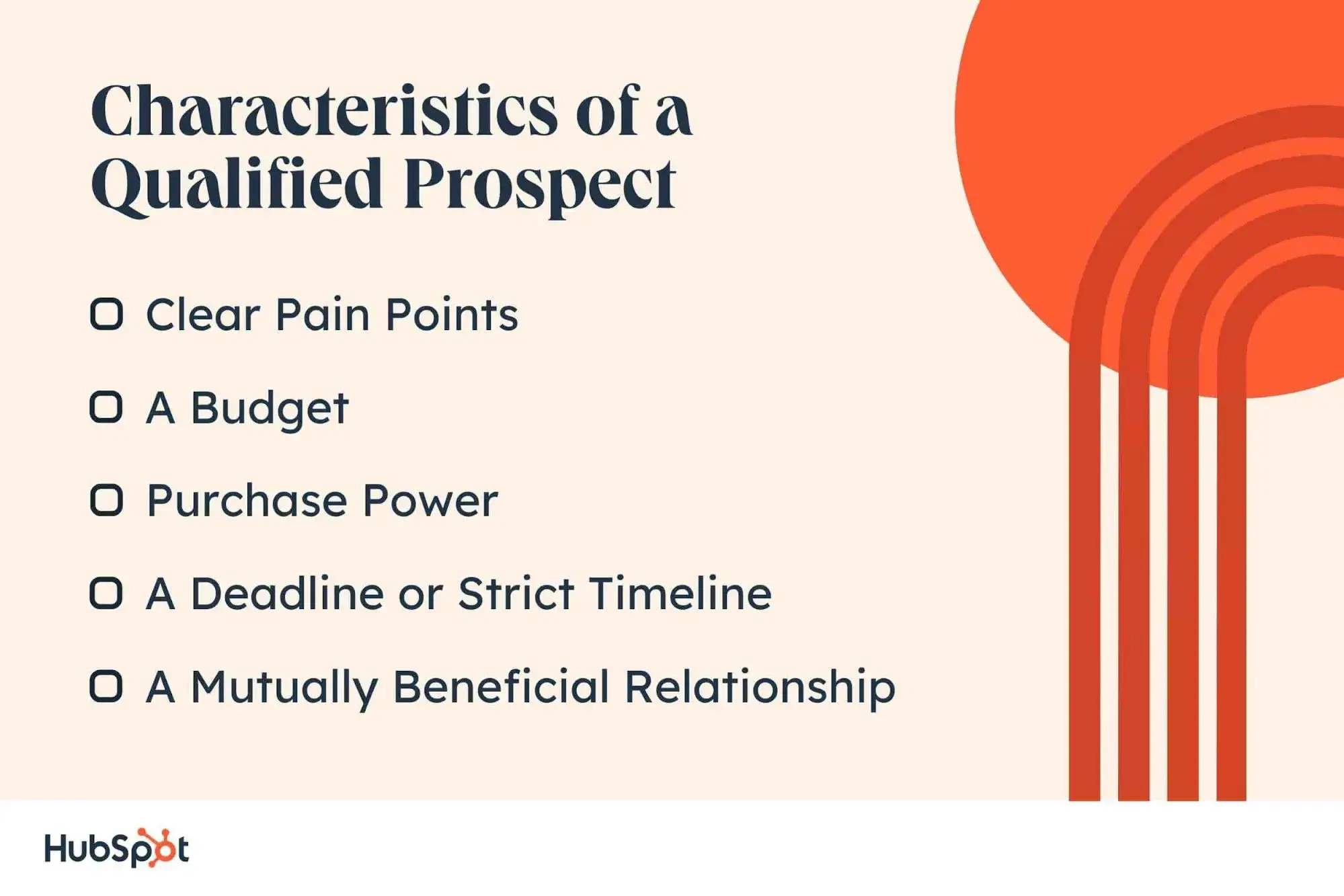
1. Clear Pain Points
PQLs need specific business challenges, not vague statements. Vague prospects are harder to nurture and close. Ask discovery questions to uncover specific pain points. Prospects aware of their challenges are more likely to qualify.
What to Look For
- Detailed answers to probing questions about pain points
- Specific issues with current solutions, indicating the need for change
2. A Budget (or a Willingness to Make One)
Have you ever had several calls with your prospect, only for the deal to die because they can’t afford your product? Discuss budget early to avoid wasting time on prospects who can't afford your product.
Ask directly about their budget for your type of solution. This upfront approach saves time and helps focus on viable prospects. Qualified prospects have clear budgets, often evidenced by current spending on similar solutions or costly problems.
What to Look For
- Budget range aligning with or exceeding your prices
- Clear commitment to purchasing a solution
3. Purchase Power
A qualified prospect will be able to either make the final buying decision or sway the stakeholders who make the decision. Identify early if your prospect is a gatekeeper, decision-maker, influencer, or blocker.
Most often, they’ll be an influencer, but they must be the right type of influencer.
Focus on upper-level influencers who can present solutions to decision-makers. Entry-level influencers like coordinators or interns are often not qualified prospects.
The decision-maker will likely be a leader and usually not the person you’ll talk to during the prospect qualification process. Research the company‘s size and structure to understand your prospect’s proximity to decision-makers. In larger companies, managers may be further from final decisions.
What to Look For
- Mid-level job title with influence
- Track record of successful product recommendations or purchases (ask for examples)
4. A Deadline or Strict Timeline
Qualified prospects have urgent needs with specific timelines (like before next quarter or year) for purchasing solutions.
Another way to tell? I like to look for prospects citing declining business performance or ROI from current solutions.
What to Look For
- Specific timeline for purchasing decision
- Clear urgency driven by business needs
5. A Mutually Beneficial Relationship
Qualified prospects understand the mutual benefits of the relationship. They trust you to provide a solution that helps them succeed in their role and impress leadership.
Remember: You’ll likely be speaking to an influencer. The influencer, in the end, wants to shine in front of leadership.
What to Look For
- Prospects who engage actively and show clear trust in the selling process
Levels of Prospect Qualification
Sales reps must qualify prospects at three different levels — organization-level, opportunity-level, and stakeholder-level qualification. I’ll discuss each below.
Organization-Level Prospect Qualification
This is the most basic level of qualification. Here, you’ll determine whether you should do more research. If your company has buyer personas, reference them when qualifying a prospect. Does the buyer match the demographics of a given persona?
Questions you should ask at this stage include:
- Is the prospect in your territory?
- Do you sell to their industry?
- What’s the company size?
Opportunity-Level Prospect Qualification
Opportunity-level qualification determines if a prospect has a specific need you can meet and if they can implement your solution.
Opportunity-level characteristics reveal if a prospect can benefit from your offering.
To determine whether your prospect is qualified on an opportunity level, ask the following:
- Is the prospect familiar with the type of product you sell?
- Do they have a challenge that your product can help them solve?
- Do they have a team or a person who’ll be using the product?
Stakeholder-Level Prospect Qualification
After confirming company fit, assess your contact's decision-making power with these questions:
- Is this purchase within your budget?
- Who else influences the decision?
- What are the purchase criteria, and who defined them?
.png)
Free Guide: 101 Sales Qualification Questions
101 Questions to Ask Contacts When Qualifying, Closing, Negotiating, and Upselling.
- Budget Questions
- Business Impact Questions
- Competitor Questions
- And More!
Download Free
All fields are required.
.png)
When and Why to Disqualify Prospects
Disqualify prospects in this order: company fit, business pain, decision-making power. Don‘t force your offering where it doesn’t fit.
You could be speaking with the CEO of an organization with complete budget authority who passes stakeholder-level qualification with flying colors. But if there’s no problem, there’s no need for your solution. Qualify for business pain first.
Prospects must qualify at all three levels to advance. Disqualify if they lack knowledge of strategic goals, even if they pass other levels.
Disqualifying prospects isn't negative — it helps focus on quality leads. Prioritize your time on the best prospects rather than spreading yourself thin across many leads.
How to Qualify a Lead with Lead Qualification Frameworks
A lead qualification framework is essentially a rubric that salespeople can use to determine whether a prospect is likely to become a successful customer.
Every customer and every sale is different, but all closed-won deals share commonalities. Sales qualification frameworks and methodologies help you qualify leads by distilling those shared characteristics into general traits reps can look for when qualifying.
The BANT Qualification Framework
BANT (Budget, Authority, Need, Timeline), the Old Faithful of sales qualification frameworks, is a widely used sales qualification framework covering key opportunity and stakeholder aspects.
BANT uncovers:
- Budget. Prospect's buying capability
- Authority. Contact's decision-making power
- Need. Business pain you can solve
- Timeline. Planned purchase date
[Video: B2B Sales Prospecting - Qualify Prospects with BANT (Budget, Authority, Need, & Time)]
Here are a few examples of BANT questions in the context of a prospect conversation:
Budget
- Do you have a budget set aside for this purchase? What is it?
- What other initiatives are you spending money on?
- Does seasonality affect your funding?
Authority
- Whose budget does this purchase come out of?
- Who else will be involved in the purchasing decision?
- How have you made purchasing decisions for products similar to ours in the past?
Need
- What challenges are you struggling with?
- Why hasn’t it been addressed before?
- What do you think could solve this problem? Why?
Timeline
- How quickly do you need to solve your problem?
- What else is a priority for you?
- Are you evaluating any other similar products or services?
- Do you have the capacity to implement this product right now?
BANT Limitations
While BANT addresses many opportunity-level requirements, it misses the mark on others.
The “ultimate” buying authority could be more than one person. Make sure you engage all relevant stakeholders early on in the process and secure each individual’s buy-in.
“Timeline” is another area where BANT falls short today. A strict BANT qualification might tell you to cycle a lead who won’t be ready to buy until next year.
MEDDIC Qualification Methodology
MEDDIC, developed by Jack Napoli at PTC, stands for Metrics, Economic Buyer, Decision Criteria, Decision Process, Identify Pain, and Champion.
MEDDIC helps sales reps understand a company's entire purchase process, improving forecasting accuracy for high-value enterprise sales.
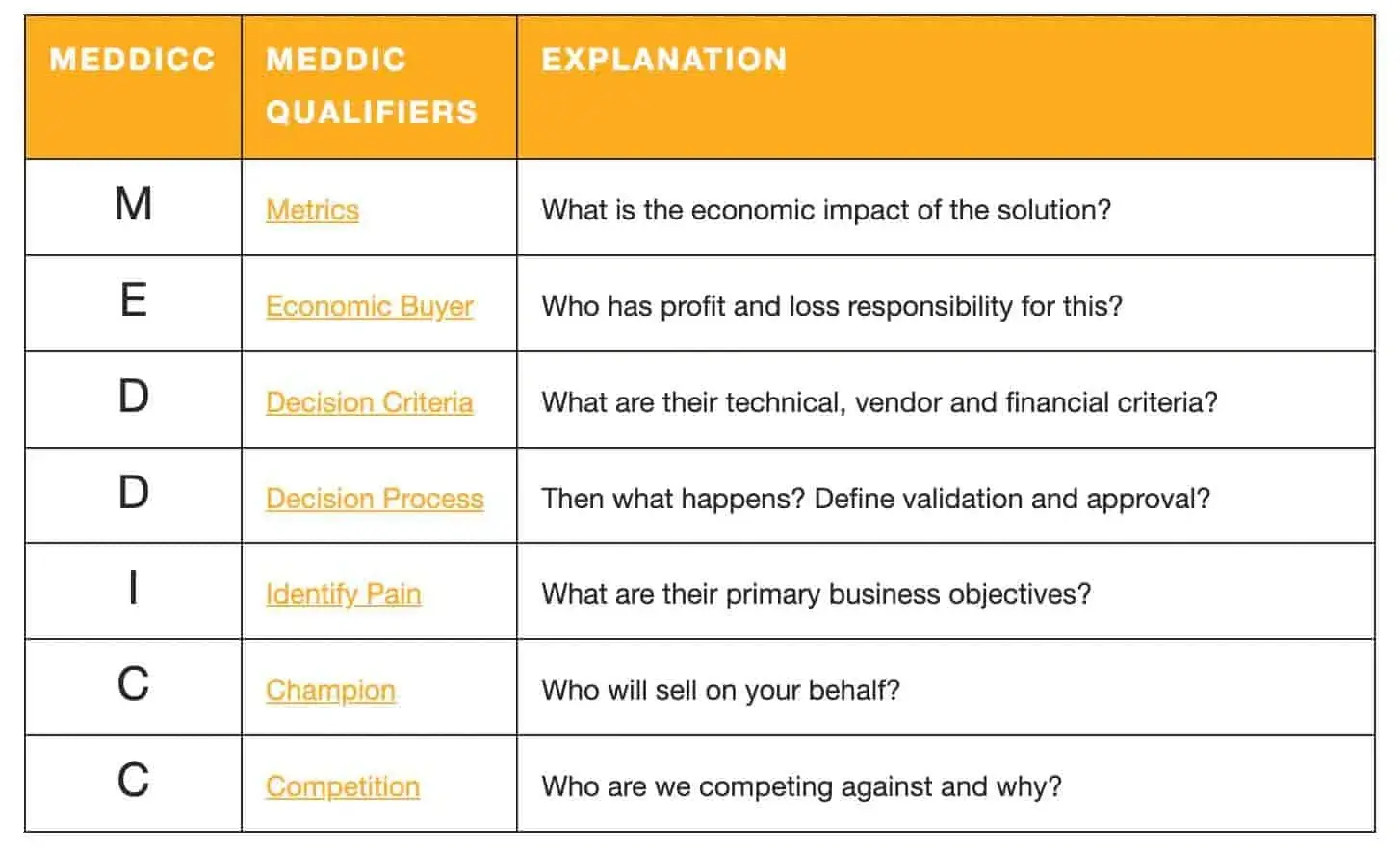
“From $0 to $100 million, [PTC was] successful because we sold a better widget,” HubSpot CEO Brian Halligan says. “From $100 million to $1 billion, we sold a shift in technology. MEDDIC became important because it‘s not just any old purchase — it’s a transformation of the business.”
MEDDIC is ideal for high-value products or those requiring business transformation. It helps understand how and why prospects buy and who champions your product internally. This information is crucial for maintaining an accurate pipeline.
CHAMP Sales Qualification Framework
The CHAMP Qualification Framework (Challenges, Authority, Money, Prioritization) prioritizes Challenges over Authority. It views authority as an opportunity to map organizational hierarchy, not a roadblock.
If your initial contact is a low-level employee, you can safely assume they won’t be the decision-maker. That doesn’t mean you should hang up the phone. Instead, ask questions that help you map the company’s organizational hierarchy to determine who to reach out to next.
GPCTBA/C&I Framework
GPCTBA/C&I (Goals, Plans, Challenges, Timeline, Budget, Authority/Negative Consequences, and Positive Implications), developed at HubSpot, responds to informed buyers by exploring prospects' strategic goals and business models beyond the immediate problem.
This means understanding a prospect’s strategic goals, their business model, and how the specific issue you’re discussing fits into the larger picture of their professional life.
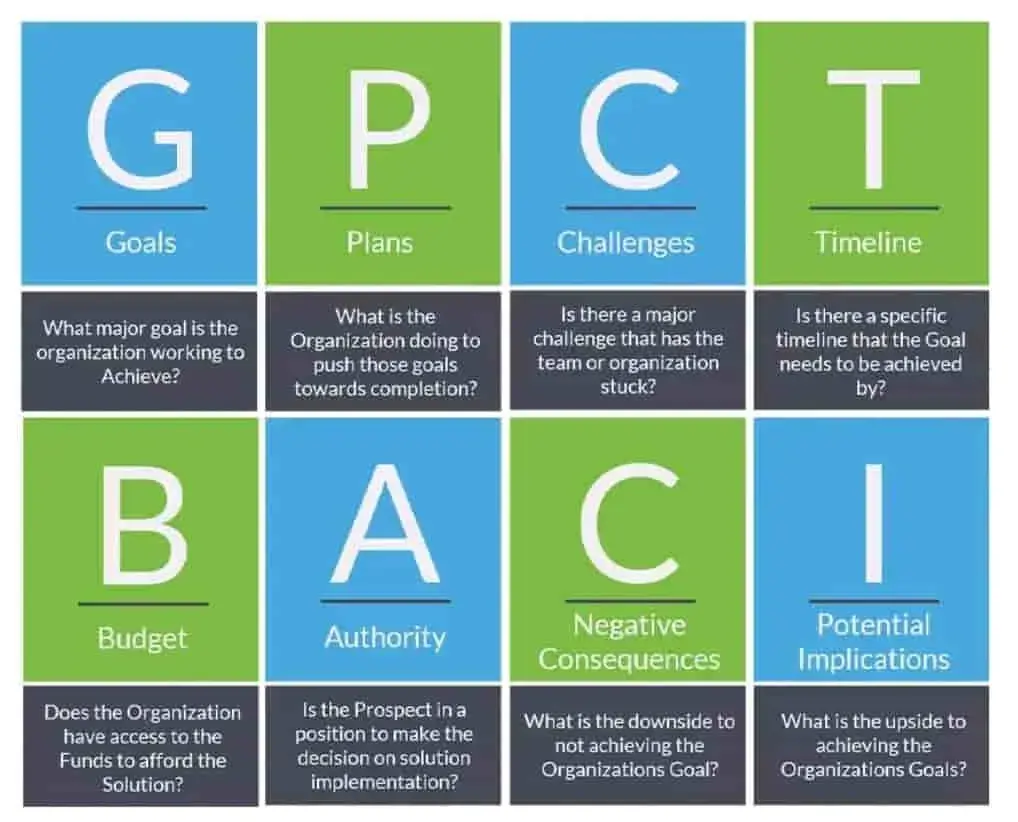
Here are some of the questions you should ask at each step.
Goals
The purpose of the following questions is to find out your prospect’s quantitative goals. You can help clarify or set goals with your prospect if their response isn’t well-defined.
- What is your top priority this year?
- Do you have specific company goals?
- Do you have published revenue goals for this quarter/year?
Plans
Once you understand your prospect’s goals, find out what work they’ve already done to achieve them. Determine what’s worked and what hasn’t, and make suggestions for improvement.
- What are you planning to do to achieve your goals?
- Do you think XYZ might make it hard to implement your plan?
- Do you have the right resources available to implement this plan?
Challenges
Defining your prospect’s challenges — and reinforcing that what they’ve already tried isn’t working — is crucial. Unless they understand that they need help, a prospect won’t become a customer.
- Why do you think you’ll be able to eliminate this challenge now, even though you’ve tried in the past and you’re still dealing with it?
- Do you think you have the internal expertise to deal with these challenges?
- If you realize early enough in the year that this plan isn’t fixing this challenge, how will you shift gears?
Timeline
Your most important asset is your time. So, while a prospect that doesn’t want to buy now or in the near future isn’t necessarily a lost cause, they should move down your priority list.
- When will you begin implementing this plan?
- Do you have the bandwidth and resources to implement this plan now?
- Would you like help thinking through the steps involved in executing this plan, so you can figure out when you should implement each piece?
Budget
Just asking “What’s your budget?” isn’t a question likely to get you valuable insight, according to HubSpot sales director Dan Tyre.
Instead, try asking:
- Are we in agreement on the potential ROI of [product or service]?
- Are you spending money on another product to solve the problem we’ve discussed?
Then, go in for the kill. Databox CEO and former HubSpot VP of Sales Pete Caputa suggests phrasing the budget question this way:
“We've established that your goal is X and that you're spending Y now to try and achieve X. But it's not working. In order to hire us, you will need to invest Z. Since Z is pretty similar to Y and you're more confident that our solution will get you to your goal, do you believe it makes sense to invest Z to hire us?”
Authority
Unlike in BANT, qualifying for authority under this framework doesn’t necessarily mean trying to determine whether your contact is a decision-maker. Your contact might be an influencer or a coach, two types of internal champions who can give you insight into the decision-maker’s thought process.
If your contact isn’t the economic buyer, ask them:
- Are the goals we’ve discussed important to [the economic buyer]?
- Amongst their priorities, where does this fall?
- What concerns do you anticipate they’ll raise?
- How should we go about getting [the economic buyer] on board?
Negative Consequences and Positive Implications
This part of the qualification process is about finding out what happens if your prospect fails.
“If your product can significantly help them avoid consequences and further aid in achieving even bigger follow-up goals, you’ve got a very strong value proposition,” Caputa says.
Here are some C&I questions to ask prospects:
- What happens if you do or don’t reach your goals? Does the outcome affect you on a personal level?
- When you overcome this challenge, what will you do next?
- Do you stand to get promoted or get more resources if you can hit your goal? Would you lose responsibility or be demoted if you don’t?
GPCTBA/C&I provides valuable insights for complex, differentiated products integral to a prospect's strategy. But its thoroughness may not suit all sales processes.
ANUM Sales Framework
ANUM (Authority, Need, Urgency, Money) is an alternative spin on BANT. When qualifying using ANUM, a sales rep’s first priority should be to determine whether they’re speaking with a decision-maker.
FAINT Sales Framework
The RAIN Group advocates using FAINT (Funds, Authority, Interest, Need, Timing) to qualify sales leads. FAINT reflects the fact that many purchase decisions are unplanned and thus won’t be associated with a set budget.
Like ANUM, reps using FAINT should look for organizations with the capacity to buy, regardless of whether a discrete budget has been set aside. FAINT also adds Interest into the mix.
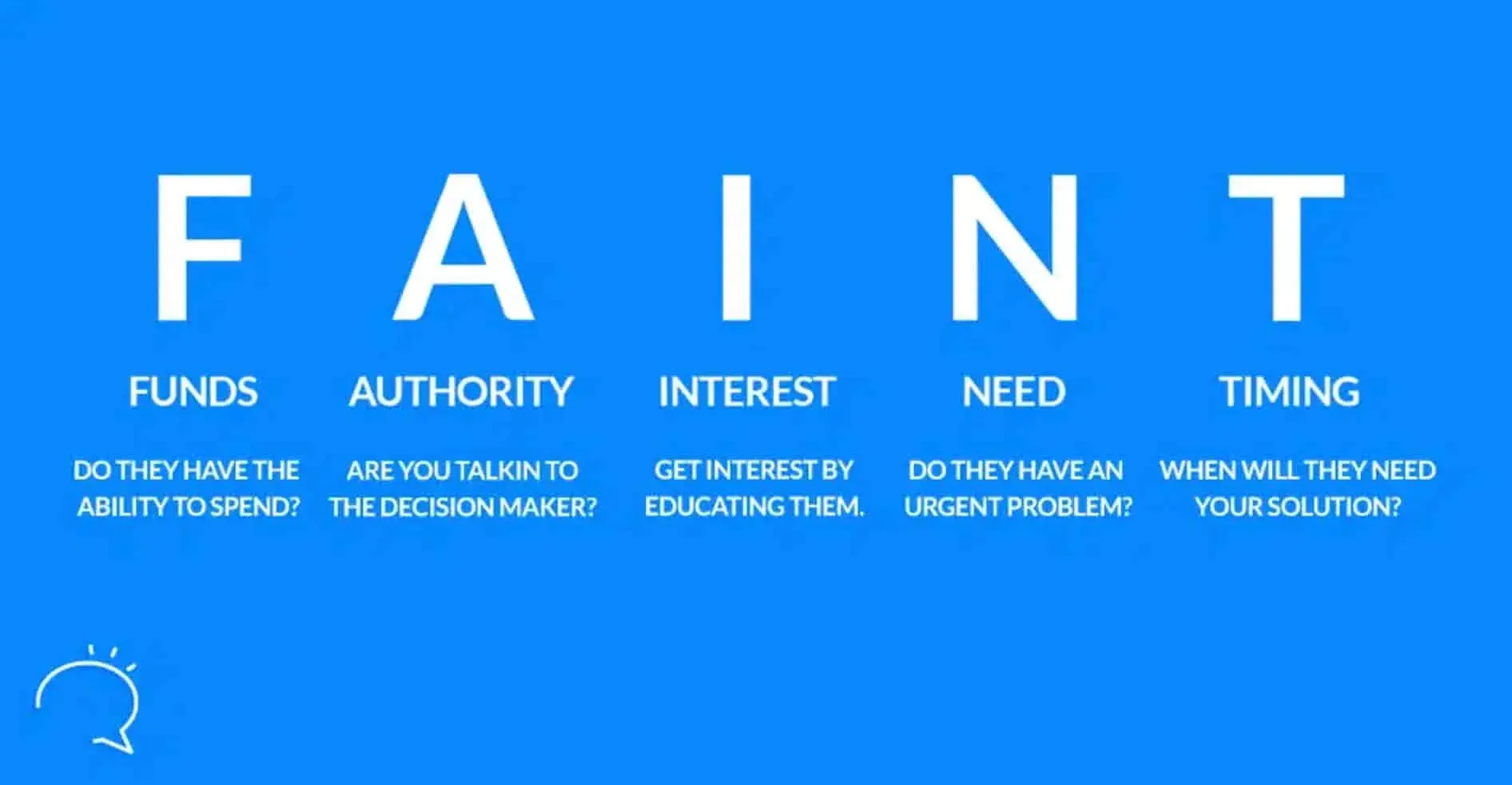
According to RAIN Group’s John Doerr and Mike Schultz, Interest is defined as “[generating] interest from the buyer in learning what’s possible and how to achieve a new and better reality than the one they have today.”
.png)
Free Guide: 101 Sales Qualification Questions
101 Questions to Ask Contacts When Qualifying, Closing, Negotiating, and Upselling.
- Budget Questions
- Business Impact Questions
- Competitor Questions
- And More!
Download Free
All fields are required.
.png)
Sales Qualifying: Good Signs and Red Flags
According to Sarah Casdorph, a demand automation manager at HubSpot, if your lead qualification framework is doing its job, the vast majority of your leads actually will not be qualified.
This isn’t a loss though.
“That nurture experience is what‘s going to keep your leads warm, so that maybe when the next budget cycle rolls around, or maybe when they’re more educated on the business problem or kind of their opportunity, then your brand will be the first one to come to mind,” Casdorph says.
In fact, companies that excel at lead nurturing generate 50% more sales-ready leads at a 33% lower cost.
At the same time, there are some telltale signs that scream “good” or “bad” leads. Here are some tip-offs (both good and bad) to listen for when qualifying a prospect that can help you determine whether to upgrade a lead or disqualify ASAP.
Good signs to move a prospect forward:
- Excuses — Indicate real pain, either through legitimate reasons or attempts to rationalize inaction.
- Specificity — Detailed answers show careful consideration of the problem. Look for sequential plans and statistics.
- Knowledge — Decision-makers show intimate understanding of company goals, challenges, and needs.
Red flags in the sales process:
- Inconsistency — Contradictory answers may indicate lack of knowledge. Consider qualifying with another contact.
- Short answers — One-word responses suggest the problem isn't pressing or the contact lacks insight. Evaluate whether to disqualify or reach out to others in the organization.
- Personal email addresses — The lead is using a personal email address (e.g. Gmail, Yahoo) rather than a business email. This may indicate they are not an actual decision-maker.
Sales Success Depends on Effective Qualification
Trust me: Your ability to find good-fit prospects will make or break your business. Prospects who turn into happy customers mean not only revenue, but increased word-of-mouth, referrals, and the possibility of cross- or upselling.
This guide can help you streamline your qualification process to find better leads, get them interested in what you’re offering, and put them on the path to ongoing purchases.
.png)
Free Guide: 101 Sales Qualification Questions
101 Questions to Ask Contacts When Qualifying, Closing, Negotiating, and Upselling.
- Budget Questions
- Business Impact Questions
- Competitor Questions
- And More!
Download Free
All fields are required.
.png)


![How to Use BANT to Qualify Prospects [Expert Tips]](https://www.hubspot.com/hubfs/bant-questions-6606f7b6c0d9e.webp)


![21 Signs Your Buyer Is a Poor Fit [Sales Process Checklist], According to HubSpot's Former Sales Director](https://www.hubspot.com/hubfs/Bad%20fit%20checklist.jpg)




![What a Client Intake Form Is & What It Should Look Like [Template]](https://53.fs1.hubspotusercontent-na1.net/hubfs/53/CLIENT%20INTAKE%20FORM%20%281%29.jpg)
